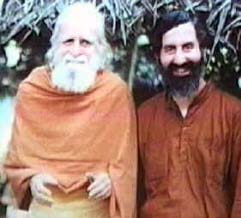Brother Wayne Commenting on Bede Griffiths

Brother Wayne at Shantivanam with Fr. Bede Griffiths
Sifting through the vast details of his experience, from his school days to his final illness, three distinct but interrelated types of mystical awareness are evident. They constitute the golden string of his inner being, the rich unfolding of grace in his unique history. The first type, natural contemplation, has already been alluded to above. This kind of contemplation - that is, the ability to perceive the divine Presence in nature - became the basis of his understanding of and appreciation for the Cosmic Revelation, especially in its distinctively Hindu form. A further type of mystical awareness in Bede can be called simply supernatural contemplation, even infused contemplation or grace. We have an instance of this in his early life when he prayed all night on his knees, losing all sense of time and all sense of self-awareness.
Essentially this was an apophatic experience, a mystical grace of dark contemplation that took him beyond any awareness of what was going on, very similar to the understanding of contemplation in the Desert Tradition which is summed up in the dictum: "If you know you're praying, you're not really praying." Preceding and following this experience, Bede did have an intense sense of the Presence of God in people, just as earlier he had perceived the Presence in the created order. India deepened this awareness of the Divine in nature, people, events and in the situations of life. He came to realize more profoundly the unity in terms of which everything subsists, and encountered the depth, ultimacy and challenge of advaita, the mystery of unity or nonduality. For Bede, this advaitic insight can only properly be understood in the light of Christ's relationship to his Father, the mystery of oneness and distinction simultaneously: the inner reality of the Trinity. The more the Persons are distinct, the more they realize their unique intimacy in the unicity of their common ground of identity. Similarly, Bede clearly saw that our relationship with God is mirrored in the relations of the divine Persons to their common nature.
Bede's experience was thoroughly advaitic, and he came to realize that all genuine mysticism is fundamentally advaitic. What distinguishes Christian advaita from a purely monistic Hindu form is its inner dynamic of love. Love is the energy of inner distinctions within the ground of the divine nature and identity. The Incarnation is a revelation of this love, this inner dynamic quality of nonduality.
Top of page